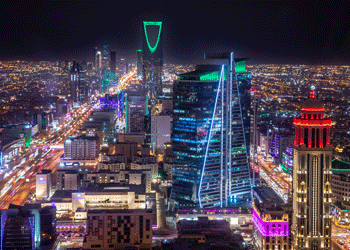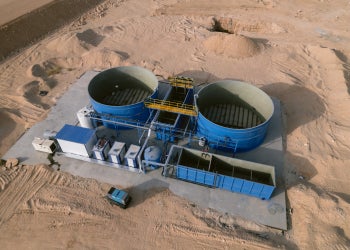The journey towards net zero
26 October 2022
Published in partnership with

The most pressing concern in the race to net zero is the need to reduce carbon emissions. According to the International Panel on Climate Change (IPCC), carbon dioxide (CO2) accounts for 76 per cent of total global greenhouse gas emissions, of which 65 per cent is a direct result of fossil fuel and industrial processes.
 Lowering CO2 output would therefore have the biggest impact on global warming.
Lowering CO2 output would therefore have the biggest impact on global warming.
The Middle East is central to this process. Although the region accounts for only 7 per cent of total global CO2 output, its emissions are some of the world’s highest on a per capita basis.
In 2021, for example, per capita emissions in the Middle East were 8 tonnes, compared with 2.3 tonnes in South America, 4.1 tonnes in Asia and 5.6 tonnes in Europe. These figures exclude the environmental impact of oil and gas exports from the region.
It is also an issue the region can no longer afford to ignore as it is particularly prone to climatic changes including reduced rainfall, heatwaves and increasingly severe weather events, such as the cyclones that have hit Oman in recent years.
Reality bites
The subject was a key talking point at the Siemens Energy Middle East & Africa Energy Week event in June, where attendees discussed decarbonisation and the government targets – 2050 for the UAE and Oman, and 2060 for Saudi Arabia and Bahrain – set as deadlines to reach net zero.
A startling finding from the event was the gap between perceptions and reality regarding what has been achieved so far in cutting emissions.
As part of Siemens Energy’s survey for its Middle East & Africa Energy Transition Readiness Index, when asked to quantify CO2 reductions in their country today and what they will be in 2030 compared to 2005, participants estimated that total emissions had fallen by 23 per cent on average over the past 17 years. Only one-third correctly answered that emissions had not fallen at all.
In fact, the opposite has taken place. Between 2005 and 2020, total global CO2 emissions increased by 50 per cent to almost 3.5 billion tonnes, according to the authoritative BP Statistical Review of World Energy 2021.
“This year, many reports were issued of which the most important is the IPCC report,” said Mohamed Nasr, director of the Environment & Sustainable Development Department at Egypt’s Foreign Affairs Ministry and lead negotiator for Egypt at Cop27, speaking at the Energy Week.
“All [of the reports] stressed that we are not on track to keep climate change below 2 degrees, or even keep the 1.5 degrees target within reach. More work needs to be done.”
Between 2005 and 2020, total global CO2 emissions increased by 50 per cent to almost 3.5 billion tonnes
BP Statistical Review of World Energy 2021
Work in progress
A second poll revealed that attendees expected emissions to fall to 39 per cent of their 2005 levels on average, a figure that is highly unlikely to be reached in just eight years.
This is especially the case given that carbon emissions must be cut across the board. Although the region is making good progress on the development of renewable energy production, there has been much lower momentum in other areas.
For example, cement production is estimated to account for between 7 per cent and 10 per cent of total carbon emissions, but despite this, there has been little in the way of new regulations on government cement output in the region.
Overall, in 2021 the industrial sector directly accounted for about a quarter of total global greenhouse emissions equivalent to 9.4 gigatonnes, a rise of 193 megatonnes on the previous year, according to the International Energy Agency (IEA). Iron, steel and cement production comprised more than half this figure.
The industry itself recognises more needs to be done and is implementing a range of policies and agreements to act co-operatively on reducing its climatic impact.
In early September for instance, the International Renewable Energy Agency (Irena) and international companies including Siemens Energy as a co-founder, Tata Steel, Enel Green Power, Technip Energies, Taqa and Eni launched the global Alliance for Industry Decarbonisation. The new alliance is aimed at accelerating net-zero ambitions and the decarbonisation of industrial value chains in accordance with the Paris Agreement. To date, 20 members have joined the alliance to work towards the same vision.
“Climate action needs industry leaders,” said Francesco La Camera, Irena director-general. “This Alliance stands for the growing commitment of global industry to act on decarbonisation and unlock opportunities that come with a green industrialisation through renewables and other transition-related technologies like green hydrogen.
“By standing together we send a clear signal of solidarity ahead of Cop27 and we invite new partners to join our common vision.”
Ultimately, we must remember that every tonne of CO2 we emit into the atmosphere will need to be removed
Dietmar Siersdorfer, Siemens Energy Middle East and the UAE
 Renewables focus
Renewables focus
Closer co-operation is a step in the right direction, but is just one element in a range of measures that need to be implemented.
When ranking the energy initiatives to reach net zero as part of the Transition Readiness Index, the Energy Week participants identified three other priorities with the highest beneficial impact: accelerating the development of renewable energy projects; reinventing energy business models; and implementing energy storage solutions.
The focus on renewables reflects the raft of utility-scale solar, hydro and wind schemes across the Middle East and Africa. In all, there are more than 500 projects planned or under way, with a total capital investment value of more than $510bn.
But there has been less progress on the other two main priorities. Energy storage solutions have gained little traction to date in the region, although Dubai’s innovative 250MW pumped hydro energy storage project in Hatta could become a template for others to follow when it comes to grid-connected storage capacity.
Nonetheless, with grids operated by centralised state utilities and renewable projects at a stage where they support conventional energy production rather than replace it, there is still some way to go before storage systems become more widespread.
For now, the principal opportunity for energy storage systems is for captive use at off-grid demand centres – for example, at Saudi Arabia’s gigaprojects along the Red Sea coast, such as the Red Sea Project and Neom. Entirely dependent on renewable energy production, the projects may require stored energy when weather conditions are unfavourable or during periods of peak demand.
Diversifying the energy business model is unsurprisingly a key priority given the region’s reliance on hydrocarbon exports. Over the past 18 months, the development of a hydrogen industry has emerged as the pre-eminent trend to enhance the Middle East’s position as the leading source of global energy supplies.
Today, there are some 46 world-scale hydrogen projects across the Middle East and Africa worth well in excess of $50bn. Although only two are under construction, the hydrogen industry is expected to grow massively in the region over the next decade.
This is just as well as time is fast running out if the world is to avoid a climatic emergency.
As Dietmar Siersdorfer, managing director of Siemens Energy Middle East and the UAE, puts it: “Ultimately, we must remember that every tonne of CO2 we emit into the atmosphere will need to be removed.”
Related reads:
- Solving Europe’s energy challenge
- Africa's energy trilemma
- Region primed for global green hydrogen leadership
Exclusive from Meed
-
 Solar deals signal Saudi Arabia’s energy ambitions
Solar deals signal Saudi Arabia’s energy ambitions13 February 2026
-
 Saudi Arabia appoints new investment minister
Saudi Arabia appoints new investment minister13 February 2026
-
 Indian firm wins major Oman substation contract
Indian firm wins major Oman substation contract12 February 2026
-
 Developers appoint contractor for $500m wastewater treatment project
Developers appoint contractor for $500m wastewater treatment project12 February 2026
-
 Dewa raises Empower stake in $1.41bn deal
Dewa raises Empower stake in $1.41bn deal12 February 2026
All of this is only 1% of what MEED.com has to offer
Subscribe now and unlock all the 153,671 articles on MEED.com
- All the latest news, data, and market intelligence across MENA at your fingerprints
- First-hand updates and inside information on projects, clients and competitors that matter to you
- 20 years' archive of information, data, and news for you to access at your convenience
- Strategize to succeed and minimise risks with timely analysis of current and future market trends

Related Articles
-
 Solar deals signal Saudi Arabia’s energy ambitions
Solar deals signal Saudi Arabia’s energy ambitions13 February 2026
 Commentary
Commentary
Mark Dowdall
Power & water editorSaudi Arabia’s recent agreement to build $2bn-worth of solar power plants in Turkiye is the latest sign that the kingdom’s energy influence is changing.
Historically, this was measured in oil barrels and export volumes. Increasingly, this is extending to capital, structuring expertise and the ability to deliver record-low tariffs in competitive markets.
Announcing the deal, Turkish Energy Minister Alparslan Bayraktar said tariffs for the plants would be the country’s lowest on record, with electricity purchased under 25-year power purchase agreements.
It followed another announcement, in January, that Acwa is investing $200m to build a large-scale solar photovoltaic (PV) plant in the Philippines.
Whether Saudi-backed companies ultimately retain long-term stakes or primarily develop and build the assets, their role at the front end is significant.
Sponsors that bring sovereign backing, clear procurement processes and access to low-cost financing can influence tariffs and contract terms from the outset.
There is also a geopolitical layer. Investing in Turkiye, or anywhere for that matter, strengthens political and economic ties at a time when regional alignments are shifting.
Energy infrastructure is also long-term by its nature. It connects ministries, regulators, lenders and operators in relationships that often extend well beyond a single transaction.
Saudi Arabia has spent the past few years refining its approach to pricing, structuring and financing large-scale renewables at home.
Exporting that expertise may not rival oil in scale or visibility, but it does signal that Saudi Arabia is becoming more than just an energy supplier.
Increasingly, it is becoming a participant in how other countries design and finance their energy transitions. That influence is still significant.
https://image.digitalinsightresearch.in/uploads/NewsArticle/15645903/main.jpg -
 Saudi Arabia appoints new investment minister
Saudi Arabia appoints new investment minister13 February 2026
Register for MEED’s 14-day trial access
King Salman Bin Abdulaziz Al-Saud has made a series of senior government changes, including Khalid Al-Falih leaving his role as investment minister to become minister of state and a member of the cabinet.
Al-Falih has been replaced by Fahad Al-Saif as investment minister. Al-Saif has been head of the Investment Strategy and Economic Insights Division at the Public Investment Fund (PIF) since 2024. That role involved formulating PIF’s long-term investment strategy. He has also served as head of the Global Capital Finance Division, a role he has held since joining PIF in 2021.
The change of investment minister comes at a time when securing investments has become a key priority for Saudi Arabia as it prepares to hand over more projects to the private sector for delivery.
King Salman also named Abdullah Al-Maghlouth as vice-minister of media and Abdulmohsen Al-Mazyad as vice-minister of tourism. Khalid Al-Yousef was named attorney general, and Sheikh Ali Al-Ahaideb will serve as president of the Board of Grievances.
Faihan Al-Sahli was selected as director general of the General Directorate of Investigation, while Abdulaziz Al-Arifi was chosen to lead the National Development Fund. Haytham Al-Ohali will head the Communications, Space and Technology Commission, and Fawaz Al-Sahli will chair the Transport General Authority.
https://image.digitalinsightresearch.in/uploads/NewsArticle/15645415/main.gif -
 Indian firm wins major Oman substation contract
Indian firm wins major Oman substation contract12 February 2026

India’s Larsen & Toubro has won a contract to build the Majan 400/220/132kV grid station in Oman.
Estimated to cost $100m, the project includes an associated 400kV line-in line-out underground cable from Sohar Free Zone to the Sohar Interconnector Station.
The contract was awarded by Oman Electricity Transmission Company (OETC), part of the government-owned Nama Group.
The grid station will comprise eight 400kV gas-insulated switchgear (GIS) bays, eight 220kV GIS bays and 10 132kV GIS bays at the new Sohar Free Zone substation.
The scope includes the installation of two 500MVA, 400/220kV transformers and two 500MVA, 220/132kV transformers.
Local firm Monenco Consulting Engineers was appointed in April last year to provide design and supervision services for the project.
As MEED exclusively revealed, the main contract was tendered in June, as part of three significant contracts to build new substations in the sultanate.
The second contract, worth about $35m, covers the construction of the Sultan Haitham City 132/33kV grid station and associated 132kV line-in line-out underground cables running 4 kilometres from Mabella to Mabella Industrial Zone.
The third contract, valued at about $100m, covers the construction of the Surab 400/33kV grid station and an associated 400kV line-in line-out cable from the Duqm grid station to the Mahout grid station.
Local firms Muscat Engineering Consulting and Hamed Engineering Services are consultants for the Sultan Haitham City and Surab projects, respectively.
The two remaining contracts are currently under bid evaluation, with awards expected this quarter.
https://image.digitalinsightresearch.in/uploads/NewsArticle/15638107/main.jpg -
 Developers appoint contractor for $500m wastewater treatment project
Developers appoint contractor for $500m wastewater treatment project12 February 2026

Register for MEED’s 14-day trial access
Egypt’s Orascom Construction has won the engineering, procurement and construction (EPC) contract for a major wastewater treatment project in Saudi Arabia’s Eastern Province.
A consortium of Saudi utilities provider Marafiq, the regional business of France’s Veolia and Bahrain/Saudi Arabia-based Lamar Holding is developing the $500m (SR1.875bn) industrial wastewater treatment plant (IWWTP) in Jubail Industrial City 2.
Sources close to the project confirmed the appointment to MEED, adding that the project has now entered the construction phase.
Industry sources also said that financial close on the project is expected to be reached in the coming days.
In September, the developer consortium was awarded a contract, under a 30-year concession agreement, by Saudi Aramco Total Refining & Petrochemical Company (Satorp), a joint venture of Saudi Aramco and France’s TotalEnergies.
The planned facility will treat and recycle wastewater from Satorp’s under-construction Amiral chemical derivatives complex, also in Jubail.
Marafiq, formally Power & Water Utility Company for Jubail and Yanbu, will own a 40% stake in the dedicated project company. Veolia Middle East SAS will hold a 35% stake, and Lamar Holding’s Lamar Arabia for Energy will hold the other 25%.
The planned IWWTP, which will primarily serve the $11bn sprawling Amiral chemicals zone, will implement advanced water treatment and recovery technologies to process complex industrial effluents, including spent caustic streams. Treated water will be reintegrated into the industrial processes, supporting closed-loop reuse and energy efficiency.
The project follows a concession-style model, akin to a public-private partnership (PPP), where the developer consortium invests in, builds and operates the wastewater plant over a 30-year period, with returns linked to service delivery.
Marafiq has been involved in several similar projects across Saudi Arabia, including as the sole owner of the Jubail industrial water treatment plant (IWTP8), which treats complex industrial effluents for petrochemical and heavy industrial companies.
In 2020, Saudi Services for Electro Mechanic Works was awarded the $202m main contract for the fourth expansion phase of IWTP8. Construction works on the project are expected to be completed by the end of the quarter.
 READ THE FEBRUARY 2026 MEED BUSINESS REVIEW – click here to view PDF
READ THE FEBRUARY 2026 MEED BUSINESS REVIEW – click here to view PDFSpending on oil and gas production surges; Doha’s efforts support extraordinary growth in 2026; Water sector regains momentum in 2025.
Distributed to senior decision-makers in the region and around the world, the February 2026 edition of MEED Business Review includes:
> AGENDA: Mena upstream spending set to soar> INDUSTRY REPORT: MEED's GCC water developer ranking> INDUSTRY REPORT: Pipeline boom lifts Mena water awards> MARKET FOCUS: Qatar’s strategy falls into place> CURRENT AFFAIRS: Iran protests elevate regional uncertainty> CONTRACT AWARDS: Contract awards decline in 2025> LEADERSHIP: Tomorrow’s communities must heal us, not just house us> INTERVIEW: AtkinsRealis on building faster> LEADERSHIP: Energy security starts with rethinking wasteTo see previous issues of MEED Business Review, please click herehttps://image.digitalinsightresearch.in/uploads/NewsArticle/15637523/main.jpg -
 Dewa raises Empower stake in $1.41bn deal
Dewa raises Empower stake in $1.41bn deal12 February 2026
Dubai Electricity & Water Authority (Dewa) has announced it has increased its stake in Emirates Central Cooling Systems Corporation (Empower) from 56% to 80%.
The transaction was completed through the purchase of 2.4 billion shares and the transfer of the entire ownership of Emirates Power Investment (EPI), which is wholly owned by Dubai Holding.
The total value of the deal is AED5.184bn ($1.41bn).
Empower currently holds over 80% of Dubai’s district cooling market and operates 88 district cooling plants across the emirate.
According to MEED Projects, the UAE’s district cooling sector currently has nine projects worth $1.29bn in the pre-execution phase.
Empower has ownership in four of these projects, which have a combined value of $472m.
This includes a $200 million district cooling plant at Dubai Science Park, with a total capacity of 47,000 refrigeration tonnes serving 80 buildings.
Empower signed a contract to design the plant last August, with construction scheduled to begin by the end of the first quarter of 2026.
The utility is also building a district cooling plant at Dubai Internet City.
UAE-based TMF Euro Foundations was recently appointed as the enabling and piling subcontractor for the project.
https://image.digitalinsightresearch.in/uploads/NewsArticle/15635949/main.jpg


